Digestion and the Digestive SystemWhat Is the Digestive System?Energy is the driving force of all body functions. The digestive system is an important organ system of animals to carry out digestion. Digestion is the process in which the food we eat is broken down into simpler substances with the help of certain chemicals called digestive juices. The food we eat is complex, and in order to extract energy from that food, enzymes act on it and make it into simpler foods like proteins, fats, carbohydrates, etc., that can be digested by different cells of the body to release energy. 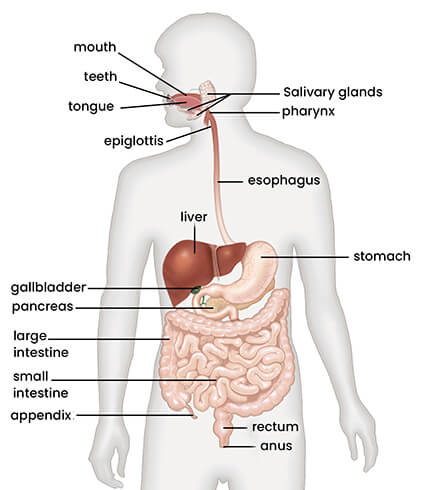
The digestive system comprises the gastrointestinal tract, the alimentary canal, and associated glands. There are five main compartments of the GI tract-mouth, esophagus, stomach, small intestine, and large intestine. The alimentary canal starts from the buccal cavity and ends at the anus. Why Is the Importance of Digestive System?The food that we eat is complex. This type of food cannot be absorbed by the cells and tissues of the body. Therefore, it needs to be broken down into simpler food. This process of converting complex food into simpler food substances is done by various digestive enzymes, which are a part of the digestive system. The digestive system consists of many organs specialized in digesting different food materials. Once the food has been digested to release energy, the waste material is excreted out of the body through other organs like the rectum and anus. All these processes of digesting food and the excretion of waste material are a part of the digestive system. What Makes Digestion Crucial?Our body needs energy to perform various tasks and processes. All these functions are supplemented by various substances like proteins, carbohydrates, fats, etc., when the body requires energy and nutrients. These nutrients come from the food we eat and the liquid we drink. Food and drinks help keep us healthy, so digestion is very important to maintain a person's health. The nutrients in the food and drinks we ingest are broken down and absorbed by our digestive system for use in vital processes, including cell development, repair, and energy production. The substances released by digestion are carbohydrates, vitamins, proteins, minerals, lipids, and water. 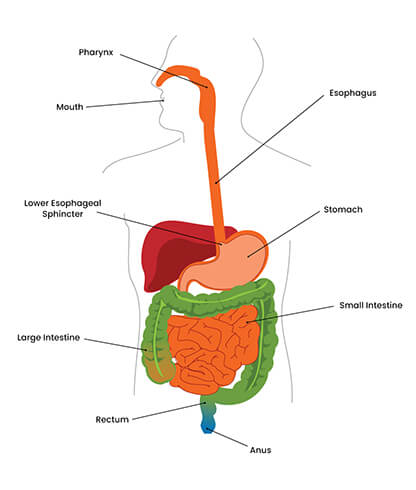
What Are the Parts of the Digestive System?The digestive system comprises an alimentary canal divided into various organs forming one complete organ system. This organ system starts from the buccal cavity and mouth, followed by the esophagus, which opens into the stomach. The digestive material from the stomach is passed on to the small intestine and the large intestine. All the waste produced as an excretory product is removed from the body through the rectum and anus. Apart from this, the pancreas, liver, and gallbladder support the system in other ways. All these organs make up the digestive system. 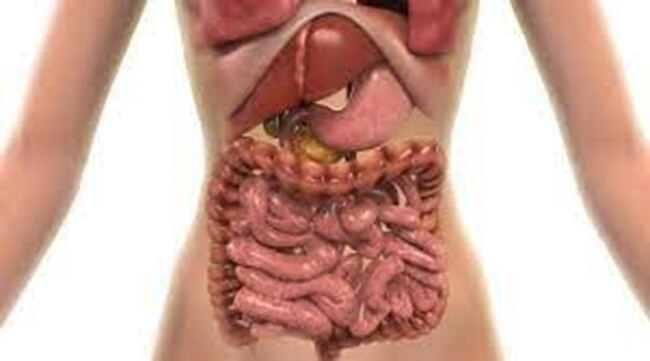
MouthThe digestive system begins in the mouth. In actuality, digestion begins even before you take a meal. Your salivary glands start to work as soon as you see the food or smell the food while being served. 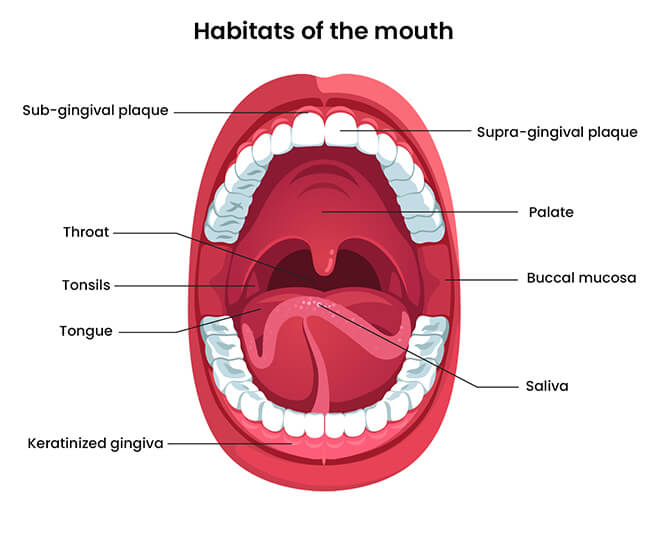
While eating, the food is broken down into small pieces with the help of the buccal cavity, which helps in chewing food. Small pieces of food are easier to pass through the alimentary canal. The food is mixed with saliva in the mouth and passed down to the esophagus. Your tongue moves the food from your mouth into your throat and esophagus as you swallow. Esophagus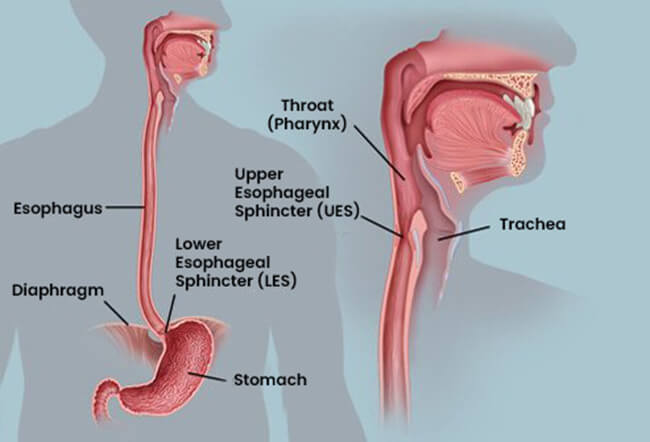
Food travels from your mouth to the esophagus, situated in your throat close to your trachea (windpipe). A little flap called the epiglottis covers your windpipe while you swallow to save you from choking (when food goes into your windpipe). Food enters your stomach through peristalsis, which involves a sequence of muscle contractions in the esophagus. Stomach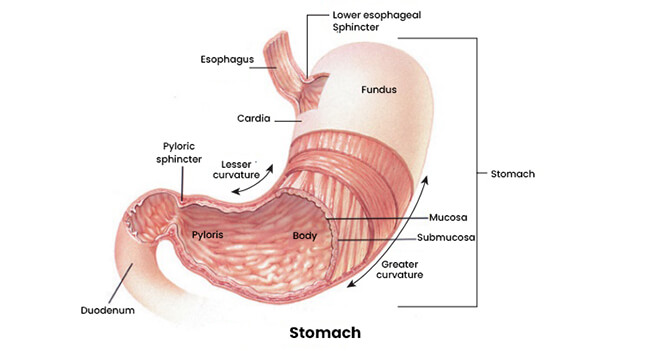
The stomach is a hollow organ that serves as a "container" for food as it is combined with stomach enzymes. These enzymes continue turning food into a form that can be consumed. The breakdown process is carried out by strong acids and potent enzymes secreted by cells in your stomach lining. The stomach's contents are discharged into the small intestine once sufficiently digested. Small intestine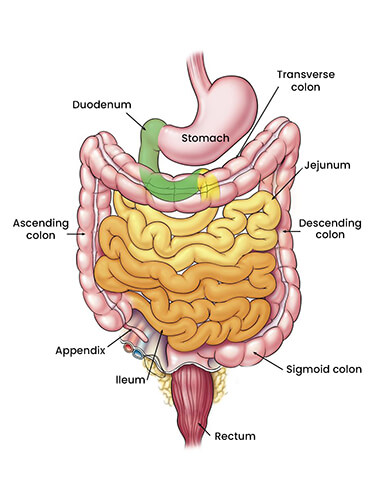
The small intestine consists of the duodenum, jejunum, and ileum. It is a muscular tube measuring 22 feet in length and used to break down food utilizing pancreatic enzymes and bile from the liver. When mixed with pancreatic and liver fluids during peristalsis, food movement through this organ is another organ's function. The small intestine's starting section is called the duodenum. It is mostly used for the ongoing breakdown process. The bottom portions of the gut, the jejunum, and ileum, are primarily in charge of nutrition absorption into the blood. The small intestine absorbs all the nutrients from this food, and only the waste is passed onto the large intestine. Once the food has passed through the small intestine, it is converted into semi-solid to liquid form. The consistency of the food is changed because of the action of various enzymes, bile, mucus, and water on the food. PancreasThe pancreas sends the digestive enzymes to the duodenum to break down protein, carbohydrates, and lipids. Additionally, the pancreas produces insulin and delivers it straight into the blood. Your body uses insulin mostly to metabolize sugar. Liver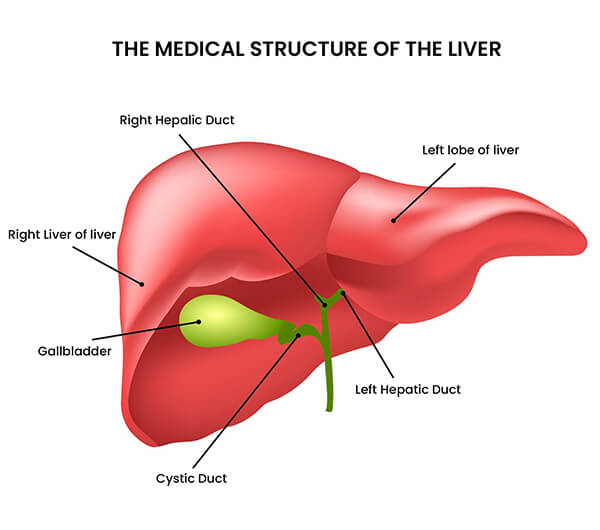
Although the liver performs a variety of tasks in the digestive system, processing the nutrients taken up from the small intestine is its primary duty. Digesting fat and several vitamins require the help of bile, which the liver secretes into the small intestine. Your body's chemical "factory" is the liver. It creates all the different chemicals your body requires to function by using the basic materials ingested by the gut. Many medicines are harmful to the body. These are also broken down and secreted by the liver. The action of the liver detoxifies all the dangerous substances in the food. Gallbladder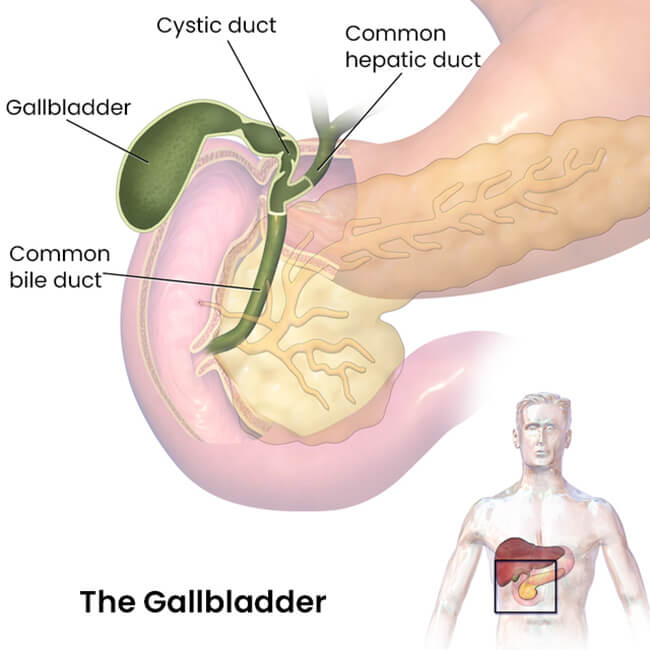
The gallbladder stores all the bile released from the liver in a concentrated form. This is then released into the duodenum region of the small intestine to help the digestion and absorption of lipids in the intestines. Colon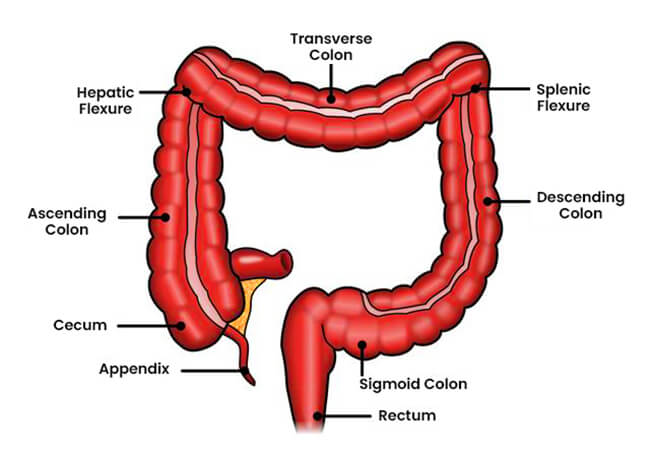
The colon is responsible for digesting waste to make it simple and convenient to empty your bowels. Cologne is a muscular tube 6 feet long, joining the small intestine to the rectum. The cecum, the ascending colon (right), the transverse colon (across), the descending colon (left), and the sigmoid colon, which joins to the rectum, make up the colon. Specific kinds of movements are present in the colon called peristalsis movement. They help remove waste or feces from the digestive system out of the body in the solid state. Water is expelled from the stool as it moves through the colon. The stool is kept in the sigmoid (S-shaped) colon until it is emptied into the rectum once or twice daily during a "mass movement." Bacteria and food particles make up the majority of the feces themselves. These "good" bacteria carry out a variety of beneficial tasks, including producing different vitamins, digesting food scraps and waste, and guarding against dangerous bacteria. It is the function of descending colon to release the waste product from the intestine into the rectum and start the excretion process. When the rectum is full of stool, with the help of bowel movements, waste is removed from the body. Stool typically passes through the colon for about 36 hours or such. Rectum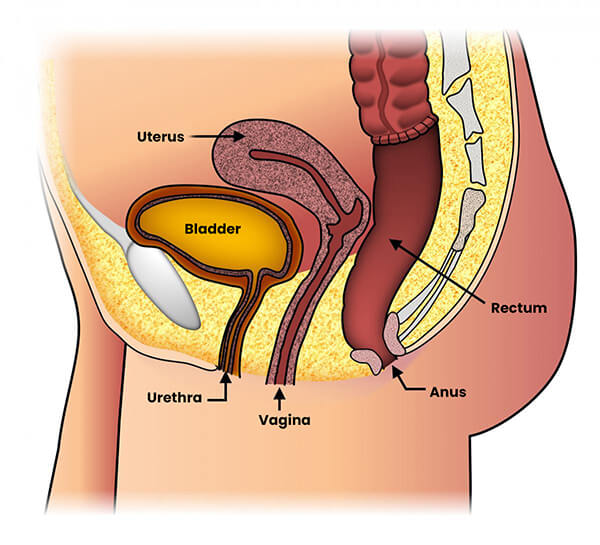
The 8-inch-long, straight chamber, known as the rectum, joins the colon to the anus. The rectum's duties include collecting feces from the colon, alerting you to the presence of stool, and holding the stool until evacuation occurs. Sensors alert the brain when something (such as gas or feces) enters the rectum. The brain then decides to expel the rectal contents. If possible, the sphincters open up, and the rectum contracts, expelling the contents. If the contents cannot be removed, the sphincter contracts, and the rectum adjusts, momentarily removing the feeling. AnusThe last component of the digestive system is the anus. It comprises 2 anal sphincters and pelvic floor muscles. The 2 sprinters make 2-inch canal systems. The upper anus' lining might pick up on rectal fluids. It informs you of the contents' liquid, gas, or solid-state. Sphincter muscles that are crucial for controlling stool surround the anus. The stool cannot come out when it shouldn't work because of the pelvic floor muscle's angle between the rectum and the anus. Except when feces enter the rectum, the internal sphincter is always tight. As a result, while we are sleeping or otherwise ignorant that stools are there, we don't defecate unintentionally. Our external sphincter helps us when we desire to use the restroom by holding the stool until we arrive at a toilet, where it relaxes and lets the contents out. Which Diseases Have an Impact on The Digestive System?The digestive system can be impacted by both short-term issues and long-term, or chronic, illnesses and disorders. It can be a symptom of a more serious disorder that calls for evaluation and treatment by a doctor. Constipation, diarrhea, and sometimes heartburn are all frequent health issues. Make sure to speak with a healthcare provider if you commonly have these digestive problems. 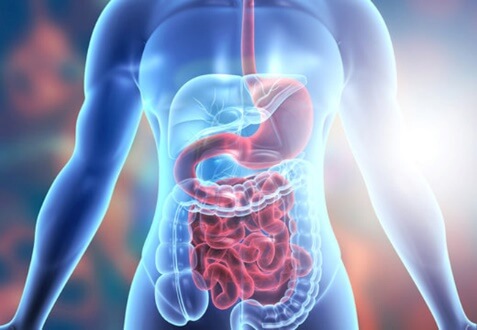
Conditions that have a short-term or transient impact on the digestive system include:
The following are examples of common gastrointestinal ailments and disorders:
How Can I Maintain the Health of My Digestive System?If you are having any problem with the digestion of food or any pain or uneasiness, always consult healthcare practitioners to know about the kind of food needed to be eaten so that you can stay healthy and manage your body. The general guidelines for maintaining a healthy digestive system are as follows:
When Should You Get in Touch with the Doctor for Problems in Digestive System?If you frequently have symptoms like constipation, diarrhea, vomiting, stomach discomfort or cramps, excessive gas (farting), or heartburn, get in touch with your doctor. While most individuals occasionally encounter these ailments, it may indicate a more significant digestive system problem if you get these more frequently.
Next TopicPlatelets
|
 For Videos Join Our Youtube Channel: Join Now
For Videos Join Our Youtube Channel: Join Now
Feedback
- Send your Feedback to [email protected]
Help Others, Please Share









